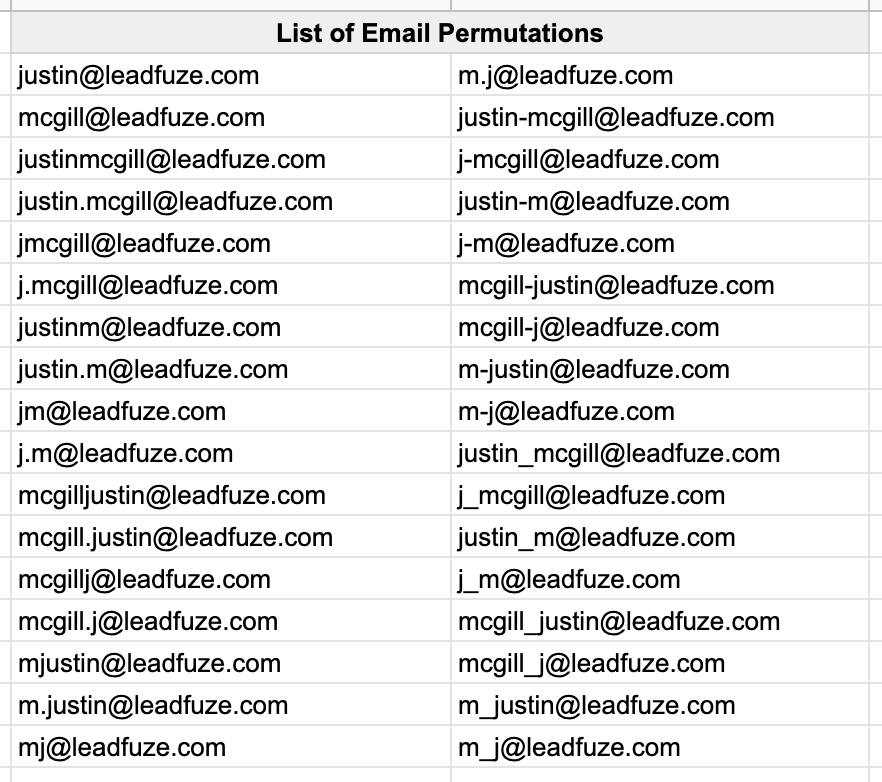Pro Reasons To Choosing An Email List Website
Pro Reasons To Choosing An Email List Website
Blog Article
What Do I Need To Consider When Buying A Pathologist Mailing List?
Be aware of these points when purchasing the pathologist's email lists to ensure that the information is accurate, compliant with the law and suitable to your marketing or outreach goals. Below are the primary aspects to consider:1. Data Accuracy and Quality
Source of Data - Verify the source of data. It could be professional directories, such as health databases or verified opt-in contacts. This ensures that the messages are current and up to date.
Verification Process - Confirm that email lists were recently verified. It is essential that service providers have a way to clean and validate emails by eliminating incorrect or inactive email addresses. High-quality lists have lower bounce rates which means they are more efficient in delivering.
Segmentation and Customization Search for lists that offer options for segmentation, such as by location and subspecialties (e.g., clinical pathology, forensic pathology) and years of experience, or hospital affiliations. Customization lets you connect with the right people more efficiently.
2. Legal Regulations
Data Privacy Regulations : Ensure the compliance of all applicable laws, including the General Data Protection Regulations (GDPR) for Europe as well as the California Consumer Privacy Acts (CCPA) for the U.S. and other laws. Pathologist data needs to be collected in a legal way, while still respecting individual privacy.
CANSPAM Act – If you’re in the U.S.A. and/or targeting U.S. pathologists make sure your email lists are compliant with. The CANSPAM Act regulates commercial emails. Non-compliance may result in heavy fines.
Consent to Opt-In: Ensure to ensure that the emails included in the list were collected by consent. This guarantees that pathologists are in agreement for promotional content to be sent, reducing the chance of complaints about spam.
3. Provider Reputation
Credibility of the Provider: Choose a reputable provider with an established track record of providing accurate and compliant email lists. Review testimonials, reviews, or references to assess the reliability of a product or service.
Transparency. The provider needs to be transparent about the way they collect and update their data. Avoid providers that are vague about the origin of their email lists.
Customer Support: It is recommended to consider a service that has an experienced customer service team for any technical issues or require help with the list.
4. Return on investment (ROI) and cost
Pricing Model: Consider various pricing models like pay-per-contact and flat-rate fees for lists or subscriptions. Check if the cost is aligned with your marketing budget and ROI potential.
Refund policy: Certain companies offer refunds or guarantee replacement in the event that an important number of emails is invalid or doesn't meet the standards promise. Make sure you check the provider's policies on refunds and replacements.
Compare the price and quality. Also, compare the additional services (e.g. CRM integration and campaign management) that are offered. The most affordable list might not be the most effective if it has poor deliverability.
5. Ownership and use of data
License Rights and Usage Rights Make sure you know if the list can be used only once or if you'll own the list for ongoing campaigns. Some providers offer single-use licenses and others permit unlimited use, which can be beneficial for long-term outreach initiatives.
Shared and exclusive. Exclusive lists: Find out whether the list of email addresses that you own is yours only or if it's shared by others. Lists shared: Identify whether you are the sole buyer on the list or if it is distributed to other buyers. Exclusive lists are likely to lead to better engagement since the list's contacts won't be receiving multiple emails.
6. Data Integration and Format
Compatibility with CRM/Email-Marketing Tools: Check that the list of emails can easily be incorporated into your CRM tool or email marketing software. Data should be accessible in a common format, such as CSV, Excel or other formats that are easy to import.
Data Segmentation. Check if it's easy to filter and segment a list after integration. Effective segmentation allows you to make personalized emails which typically have higher open and reply rates.
7. Ethical Questions
Relevance of your message Pathologists are highly-skilled professionals. Ensure that your product, service or message is appropriate to their needs. Sending irrelevant data could hurt your brand reputation and could result in complaints about spam.
Spam reports are often due to sending out unrequested emails or content. Make sure you are careful and utilize the guidelines in planning your campaigns to avoid damaging your sender's reputation.
Conclusion
If you do it right, purchasing a pathologist's email list can be an effective marketing tool. Prioritize the quality of data as well as legal compliance and the reputation of your provider to maximize your outreach potential. Make sure you tailor the list to your needs and adhere to all data privacy laws and ethical marketing practices. By considering these factors and ensuring that you are able to design an effective and efficient email campaign directed at pathologists. View the recommended pathologist email list for more tips.
What Do I Need To Consider When Buying An Urgent Email List?
When purchasing an urgent care email list it's essential to evaluate various aspects to make sure the list is correct, efficient legal, compliant and appropriate to your goals in marketing. Here are some key considerations. Data Quality and Accuracy
Source of Data: Be sure the data is collected from trustworthy sources, like medical associations, healthcare databases or professional directories. Beware of lists that are generated through scraping data or unreliable means as they could contain incorrect and outdated information.
Verification Procedure: Confirm that the list of email addresses is continuously verified and updated. A reliable supplier will have a rigorous verification process to eliminate outdated or invalid email addresses. This process ensures an excellent delivery rate and lowers bounce rates.
Segmentation and Targeting: The list should offer different options for segmentation, including location (city or state, region) and the dimensions of the urgent care facility as well as the types of services offered (e.g., diagnostics, pediatrics), and decisions-making roles (e.g., doctors, practice owners, etc.). A targeted list increases the effectiveness of your outreach and increases engagement rates.
2. Legal Regulations
Data Privacy Laws: Ensure that you are in compliance with national and local laws, including the California Consumer Privacy Act, which is applicable in the U.S.A. and also as applicable European laws on data protection. It is a requirement that data collected from email addresses must be processed with the right consent, and then processed in a legal manner.
Compliance with the CANSPAM Act Compliance with CANSPAM Act: All email marketing campaigns within the U.S. must adhere to the CANSPAM Act. Incorporate the physical address of your company, stay clear of misleading subject lines and provide an easy opt-out mechanism. Non-compliance can lead to penalties and damaged brand reputation.
Opt-In Consent: Ensure that the email addresses on the list have been obtained with explicit opt-in consent which means that the recipients have opted-in to receive third-party marketing communications. This reduces the chance of legal and spam-related complaints.
3. Provider Reputation
Established Providers: Choose a service provider that has established track records of offering high-quality and reliable lists. To evaluate the reliability of a service and customers' satisfaction, look through reviews, testimonials and case studies.
Transparency. Providers need to be transparent about the way in which the data is collected, and when they update it. If the company isn't able to give clear information about their data collection methods It could be a sign of poor quality data.
Customer support is vital when your business requires help with compliance issues or technical issues, or even customizations. A responsive provider can assist you in gaining the maximum value from your email list.
4. Cost as well as Cost and Return on Investment (ROI)
Email list providers usually have different pricing plans, including flat-fees or pay-per-contact. The pricing model must be considered in conjunction with the marketing budget you have and the ROI that you expect. Make sure you balance the price of the list with the validity and accuracy of the information.
Refund or Replace Policy: Many trustworthy providers will provide an option for refund or replacement if you discover that a significant number of your email addresses are invalid. Make sure you understand the policy before buying.
Cost-effective: Don't choose the cheapest alternative. Instead, choose lists that are precise and feature precise segmentation. A database that is of high quality will increase the engagement of users and improve return on investment.
5. Use and Ownership of Data
Single-Use vs. Multi-Use: Clarify whether you are able to make use of the list for a single campaign or multiple times. Multi-use lists are more beneficial particularly if your goal is to run a series of outreach campaigns.
Exclusive vs. Shared Lists: Determine if the list is solely for your company or shared with other buyers. Shared lists can lead to list exhaustion as the recipients receive marketing communications from several businesses.
6. Data Integration and Format
Check for CRM compatibility: Make sure the email list is provided in a format compatible with your customer relationship management (CRM) or marketing email platform such as CSV or Excel. This ensures smooth integration and allows you to begin your campaigns in a short time.
Ease of Use: The email list must be simple to manage and segment based on the criteria you have set. A well-organized list will make targeting and personalization more effective.
7. Ethical aspects
Content Relevance: Professionals in Urgent Care are often busy and occupied So your message must be valuable and relevant. You should tailor your message to their specific needs, like medical supplies, equipment or technology for healthcare that are compatible with operations in urgent care. Inadequate content can damage your brand and reduce engagement.
Avoid Spam by being aware of the frequency you send email. Over-emailing or sending unsolicited messages can lead to spam complaints and lower the reputation of your sender.
Conclusion
Make sure you are aware of the accuracy of your data as well as legal compliance, and the reputation of the company you choose to purchase an email list to provide urgent care. Make sure the list has been separated. The information should be updated regularly and must comply with all privacy laws. The sending of relevant content to a targeted and high-quality list will increase engagement and allow you to achieve a positive return on investment. Check out the top urgent care email list for site guide.